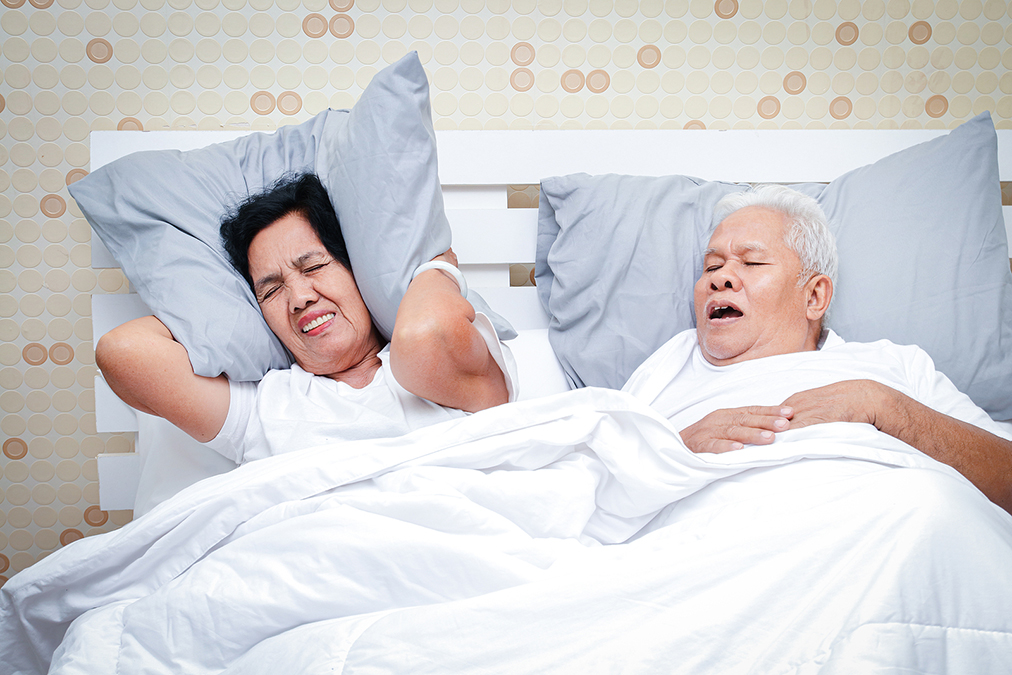 Type 2 diabetes and high blood sugar levels are usually blamed on bad diet and lack of exercise.
Type 2 diabetes and high blood sugar levels are usually blamed on bad diet and lack of exercise.
But could it be something much simpler, something that looked completely unrelated at first glance?
Yes, says a new study published in the Journal of the American Heart Association—and it’s connected to snoring.
The study used the data of 789 African-American men and women from the Jackson Heart Study, the largest study of cardiovascular disease in African-Americans.
The average age was 63 years old. Of the participants, 581 were women, 198 had diabetes, and 158 were taking diabetes medication.
The study gave the participants an actigraph wrist watch to monitor their sleep quality, including long and short sleep duration, sleep disruptions, night-to-night sleep variability, and sleep efficiency.
The study also monitored the subject’s blood oxygen levels to test for sleep apnea severity, grouping them into those with no sleep apnea and mild, moderate, and severe sleep apnea.
The participant’s blood glucose levels were monitored continually throughout the study.
The subjects who suffered from severe sleep apnea had a 14 percent higher fasting glucose score than those without sleep apnea. They also had higher HbA1c levels, which is a measure of long-term blood sugar.
The first step in addressing type 2 diabetes therefore may be as simple as addressing snoring. Almost everyone who snores has some level of sleep apnea.
Fortunately, you can eliminate snoring and sleep apnea in as little as three minutes using the simple throat exercises explained here….
And if you have already been diagnosed with type 2 diabetes or prediabetes, follow the three steps explained here to reverse it….

 Overcoming IBD
Overcoming IBD Multiple Sclerosis
Multiple Sclerosis Banishing Bronchitis
Banishing Bronchitis Gum Disease Gone
Gum Disease Gone Overcoming Onychomycosis
Overcoming Onychomycosis Neuropathy No More
Neuropathy No More The Prostate Protocol
The Prostate Protocol Brain Booster
Brain Booster
 Ironbound
Ironbound
 Solution for Shingles
Solution for Shingles
 The Bone Density Solution
The Bone Density Solution
 The Ultimate Healing Protocol
The Ultimate Healing Protocol
 The Parkinson's Protocol
The Parkinson's Protocol
 The Chronic Kidney Disease Solution
The Chronic Kidney Disease Solution
 Overthrowing Anxiety
Overthrowing Anxiety The Fatty Liver Solution
The Fatty Liver Solution The Hypothyroidism Solution
The Hypothyroidism Solution
 The End of Gout
The End of Gout The Blood Pressure Program
The Blood Pressure Program
 The Oxigized Cholesterol Strategy
The Oxigized Cholesterol Strategy
 Stop Snoring And Sleep Apnea Program
Stop Snoring And Sleep Apnea Program
 The Arthritis Strategy
The Arthritis Strategy The Vertigo & Dizziness Program
The Vertigo & Dizziness Program The 3-Step Diabetes Strategy
The 3-Step Diabetes Strategy Hemorrhoids Healing Protocol
Hemorrhoids Healing Protocol The Erectile Dysfunction Master
The Erectile Dysfunction Master Weight Loss Breeze
Weight Loss Breeze The IBS Program
The IBS Program The Insomnia Program
The Insomnia Program The Migraine and Headache Program
The Migraine and Headache Program The Neck Pain Solution
The Neck Pain Solution The Menopause Solution
The Menopause Solution The Ejaculation Master
The Ejaculation Master The TMJ Solution
The TMJ Solution The Acid Reflux Solution
The Acid Reflux Solution The Fibromyalgia Solution
The Fibromyalgia Solution The Psoriasis Strategy
The Psoriasis Strategy